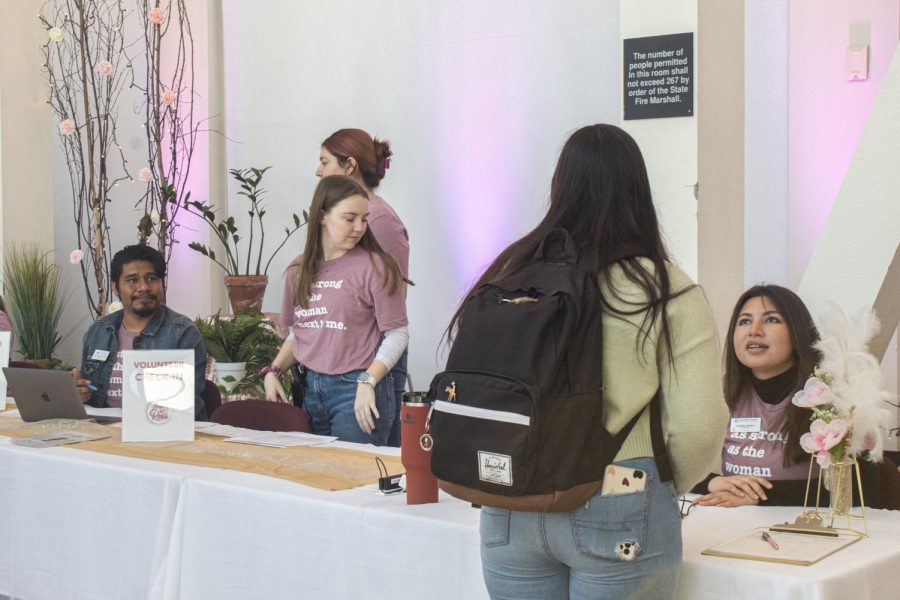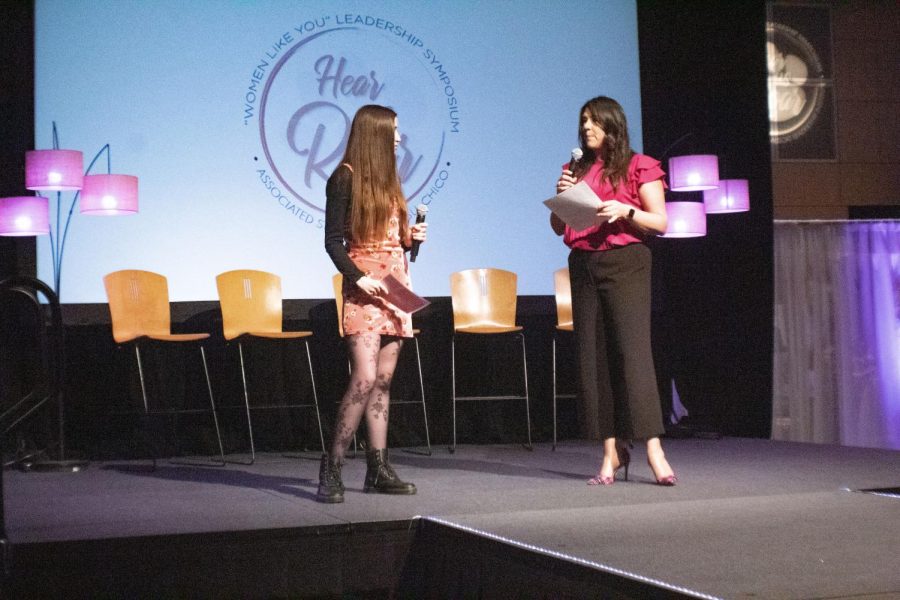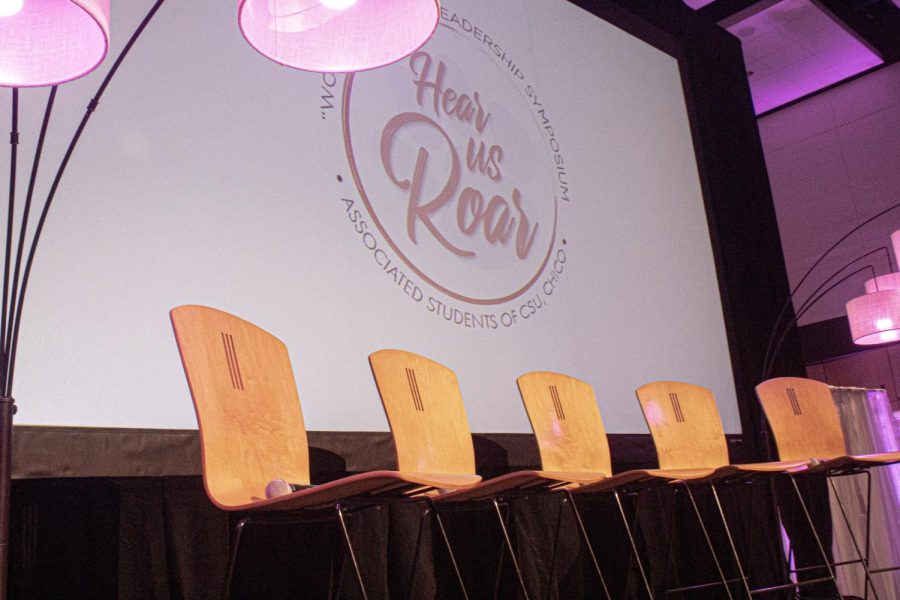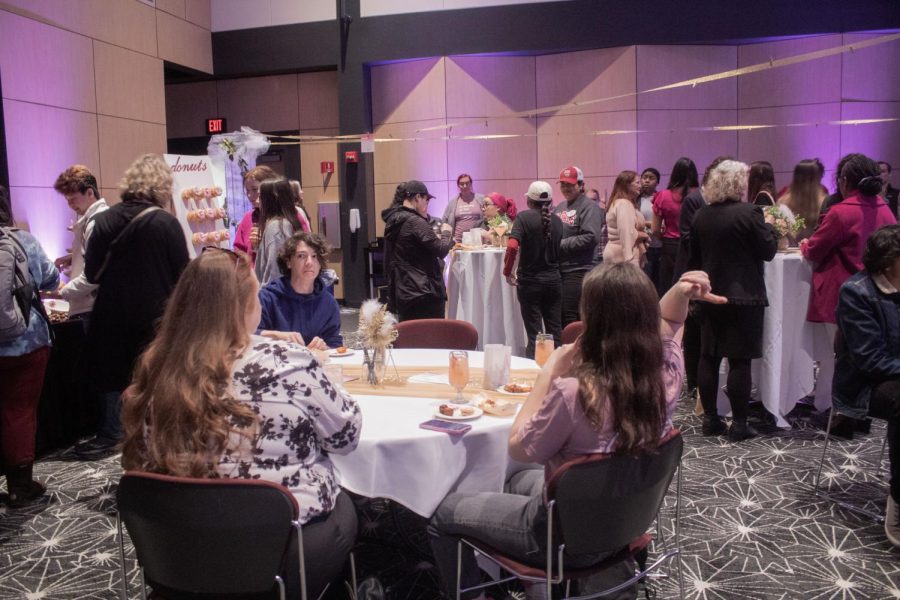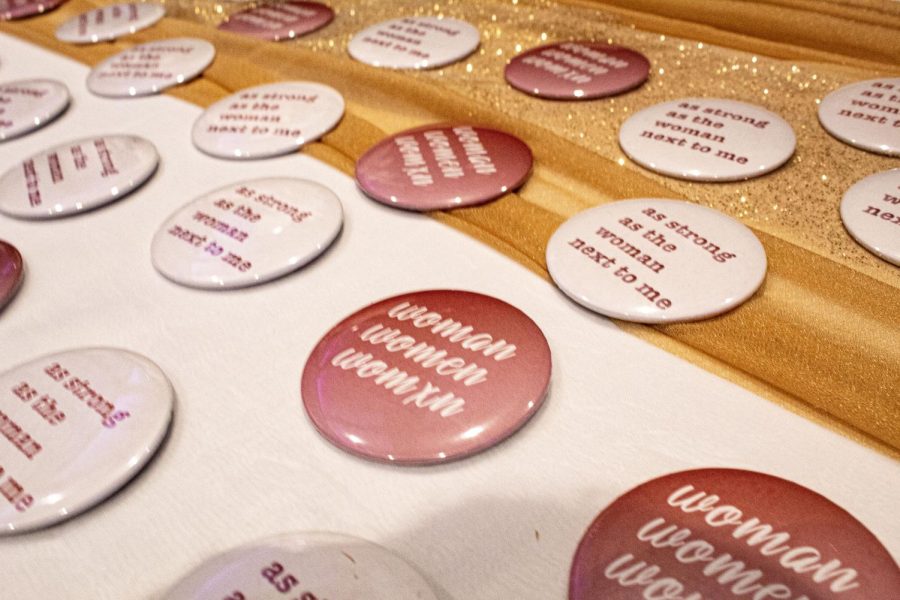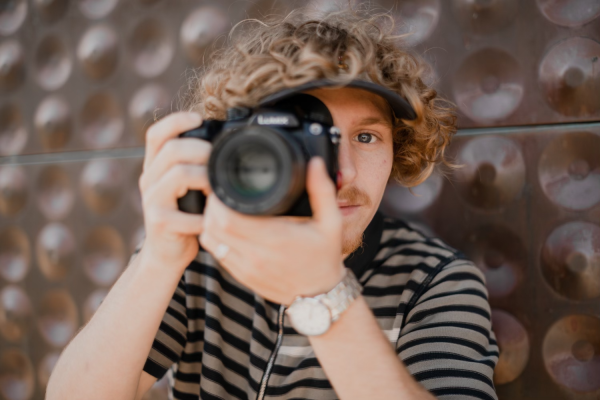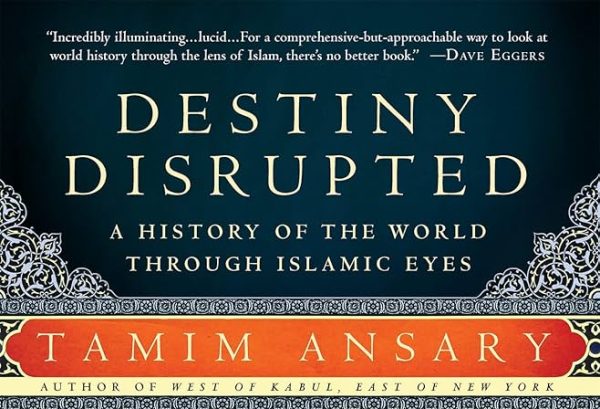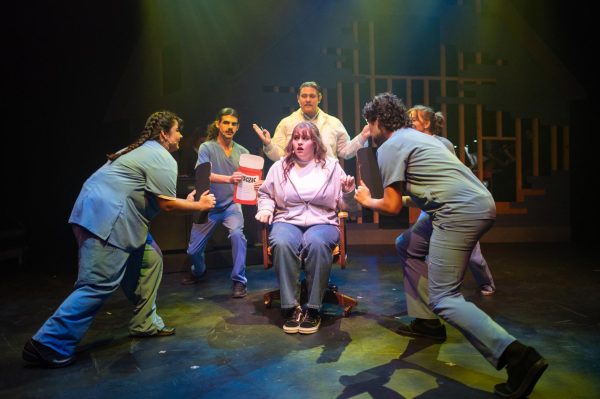Juanita Mottley at leadership symposium: ‘Stop telling me to be strong; I don’t need to be strong’
Multiple mauve and white pins sit on a table waiting for attendees to pick them up. Taken by Ariana Powell, March 3.
The Bell Memorial Union Auditorium was transformed into a space for empowering dialogue on Friday, as the Associated Students hosted the third “Women Like You” Leadership Symposium. An event designed to provide a safe space for honest and vulnerable discussions surrounding women’s issues, according to AS Assistant Marketing and Design Director Anna Paladini.
Four panel members and five guest speakers stepped onto a t-shaped stage that lay under tungsten LED string lights and a glinting disco ball. Music like Cyndi Lauper’s “Girls Just Want to Have Fun,” and Gloria Gayner’s “I Will Survive” echoed through the divided space. As attendees filtered into the auditorium they were met with a pastel-themed candy bar containing gummy worms, Hershey’s kisses, candied popcorn, chocolate-covered pretzels and other sweet treats.
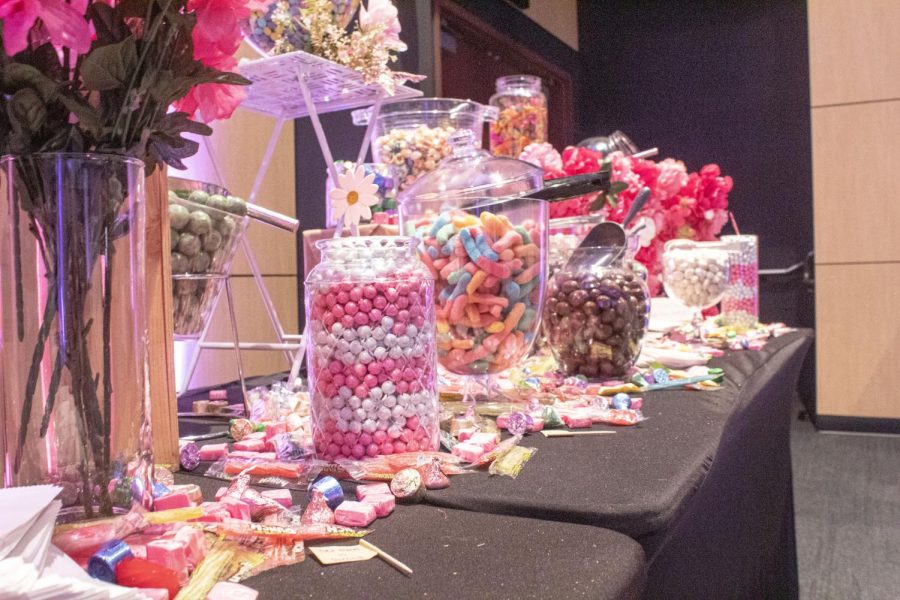
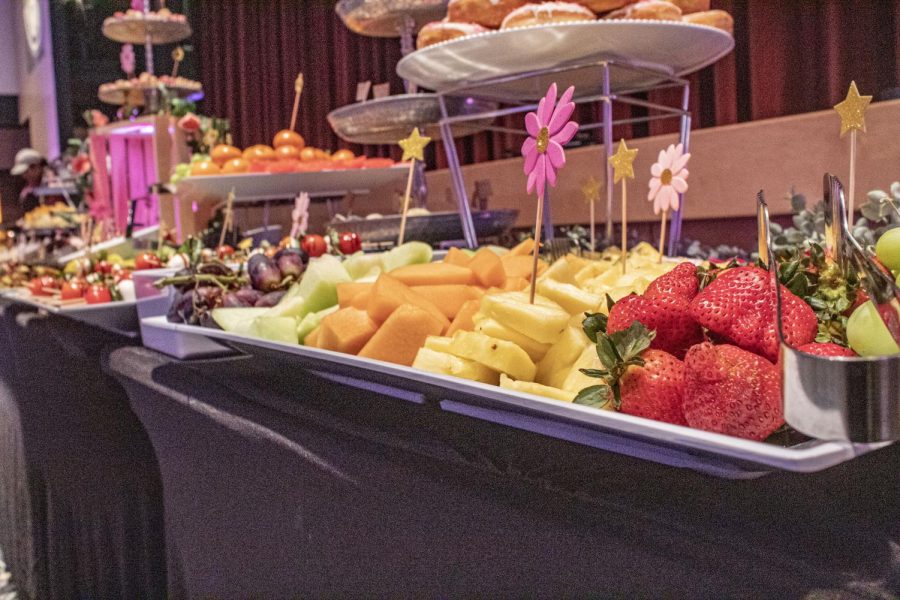
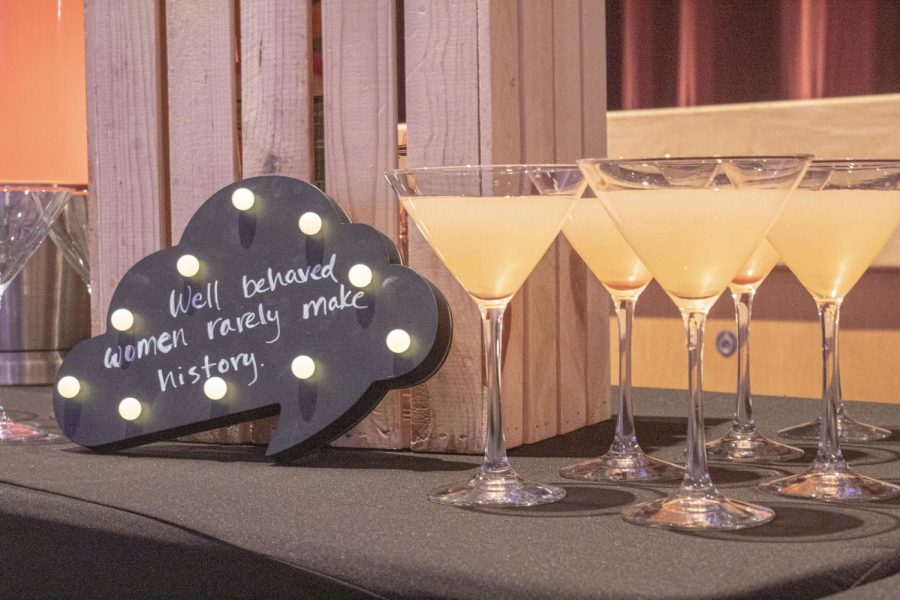
Like an assembly line, those who grabbed a bag full of candy would then move onto the mashed potato bar, which offered toppings such as bacon and gravy. People could also choose meatballs, vegan meatballs and macaroni-and-cheese bites as a side.
From there attendees could pick up a custom mocktail, either a “Girl Boss, Mic Drop” raspberry lemondrop garnished with cotton candy, or a “Manifest your Motto” raspberry mojito garnished with mint. The final stop for those craving sustenance was a snack bar which included various meats, cheeses, colorful macarons, truffles and a donut display.
They also had the opportunity to fill out cards describing how “women like you” were empowering. Writers could also address the card to someone specific. Each card was then hung up on crisscrossing ribbons for all to read.
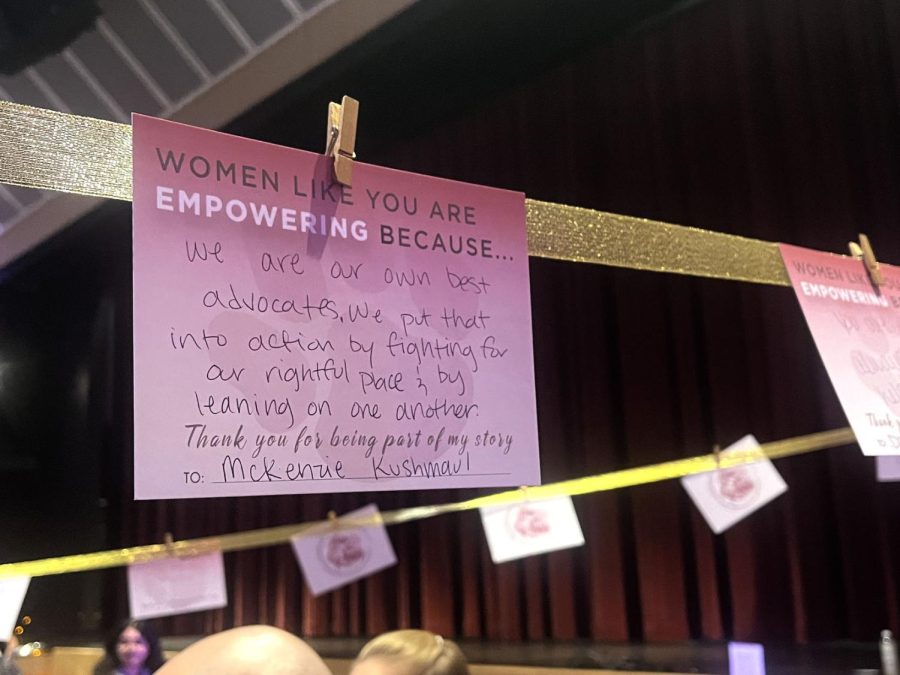
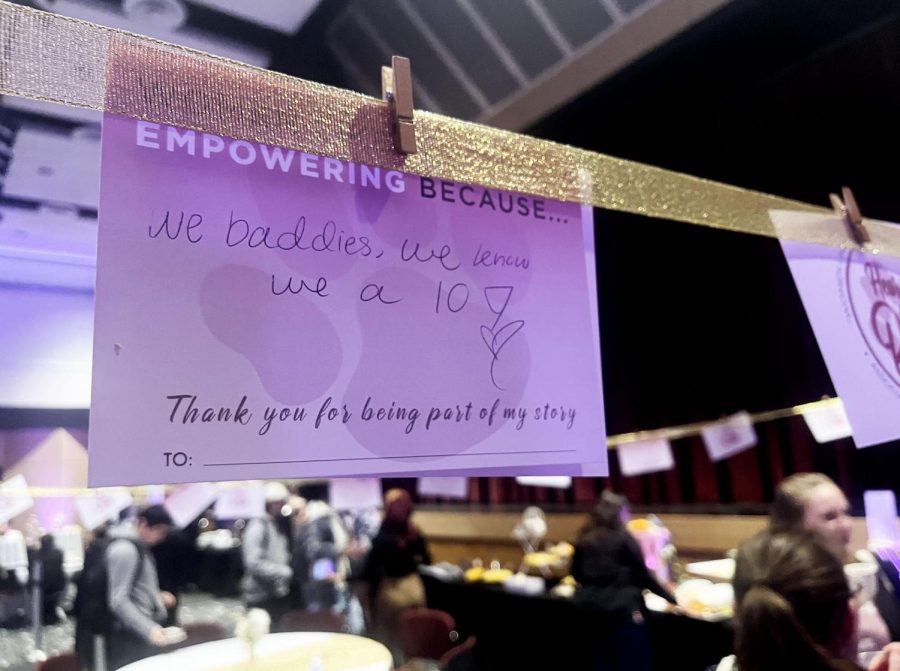
The symposium was led up to by multiple events starting on Feb. 22 with pink shirt day and ending on March 2 with a ladies’ night with Adventure Outings at The WREC involving outdoor recreation, snacks and short films.
The panel members included Chico State President Gayle Hutchinson, Vice President of Business and Finance Ann Sherman, Vice President for Information Technology and Chief Information Officer Monique Sendze and Chief of Staff Seema Sehrawat.
Vice President of Facilities and Services Michelle Davis facilitated a panel discussion with these four women.

During the panel Hutchinson described her journey as a woman. Growing up Hutchinson said that she often got comments such as “What do you know about that Gayle? You’re a girl,” and in college others like “Let’s ask the guys to do it” circulated. However, Hutchinson said that once she established credibility at Chico State she was accepted as a woman.
Similarly, Sehrawat shared a lesson on the importance of being uncomfortable. The chief of staff described how she has always been uncomfortable throughout her life, but today she can choose to be uncomfortable because that’s where the most growth and learning happens. She also stated “I needed to fake it to make it, and I did,” after transitioning to a dean position four years ago.
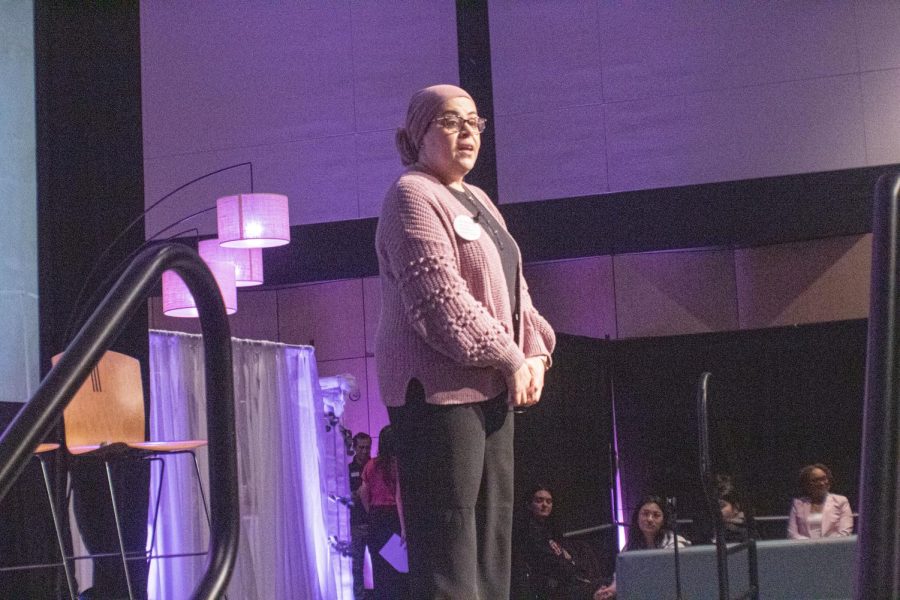
Another guest speaker, electrical engineering and computer engineering associate professor, Hadil Mustafa, echoed Sehrawat’s message regarding faking it. Mustafa additionally stated that she always does her homework, so that at least 80% to 90% of the time she’s right.
Mustafa, born in Egypt, but who calls southern California home despite living in Chico, told the story of Hatesheput, the first Egyptian woman pharaoh. She described how prior to the leader becoming pharaoh, the statues depicting her had an obvious feminine look, but after becoming pharaoh, her statues were more masculine-leaning, even showing her to have a beard.
Mustafa used this as an example of the confidence gap, a term she gave two definitions for. It is “the tendency of women to be less assured than their male counterparts,” or more simply, the lack of belief in oneself. Mustafa delved into a study surrounding the term. She said that there were two conclusions. One being that regardless of culture or country, men have a higher self-esteem than women. The second was that those in western cultures had a larger confidence gap than those in eastern countries.
She ended her speech with a message, “Women deserve to be treated the same as men in any field, don’t be afraid of sharing your story.”
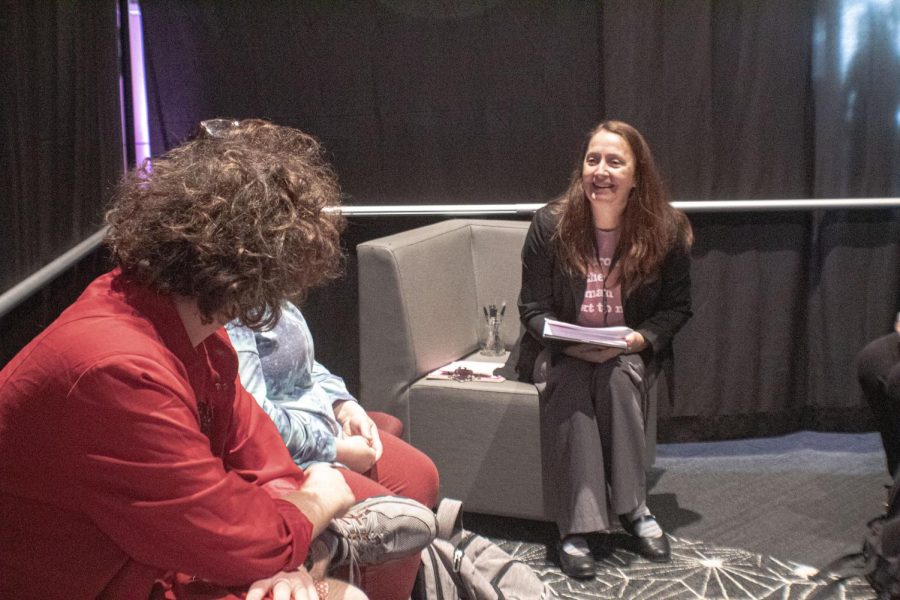
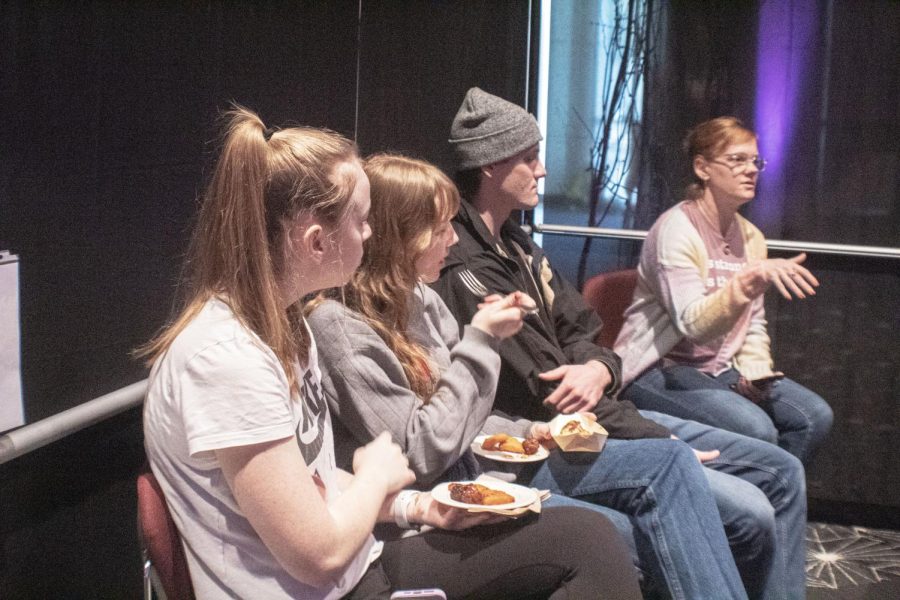
Between each guest speaker, attendees were given 10 minutes to have a discussion lead by facilitators. The area around the stage was split into 10 “pods,” where people could sit and talk.
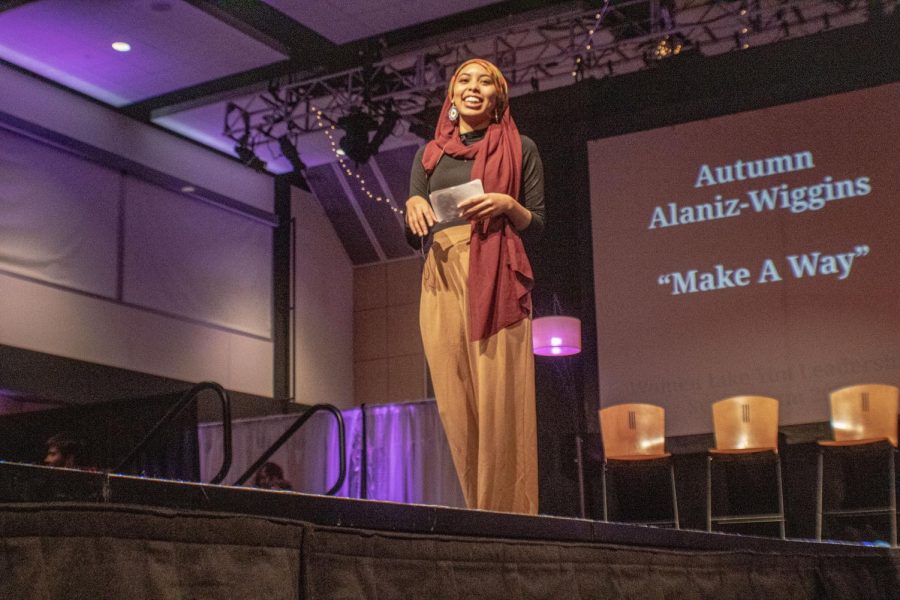
AS director of social justice and equity, Autumn Alaniz-Wiggins, shared her journey. Above all she praised her mother for teaching her the “Alaniz way.” To Alaniz-Wiggins it’s not just a last name, but a way of life. Her mother, Roxanne, used to say that “Alaniz make a way,” emphasizing the spirit of perseverance.
Growing up her mother worked in other countries to make money to support her children from afar, because “it was better than being in a broken home.” In her mother’s absence she describes how she conformed to her father’s views of what a woman should be, where “any sign of resistance was met by a backhand.”
During college she realized her relationship with her father was not healthy, and began to push back and ignore him. She eventually ended up taking a year and a half off of college. It was a time during which she lived many lives, such as working as a dietary aide at an old folks home and working on an organic farm in Florida.
She also lost her grandmother during this time. After her death she discovered that her grandmother, who like her was a Black woman, had a masters degree in business from a historically Black university.
“She grew up in Jim Crow segregated south, and she was a trailblazer,” Alaniz-Wiggins said.
Alaniz-Wiggins ended her journey by saying that whether you’re having fun or experiencing trauma, people will say you shouldn’t do or be something. However, she knows her worth and will follow the Alaniz way.
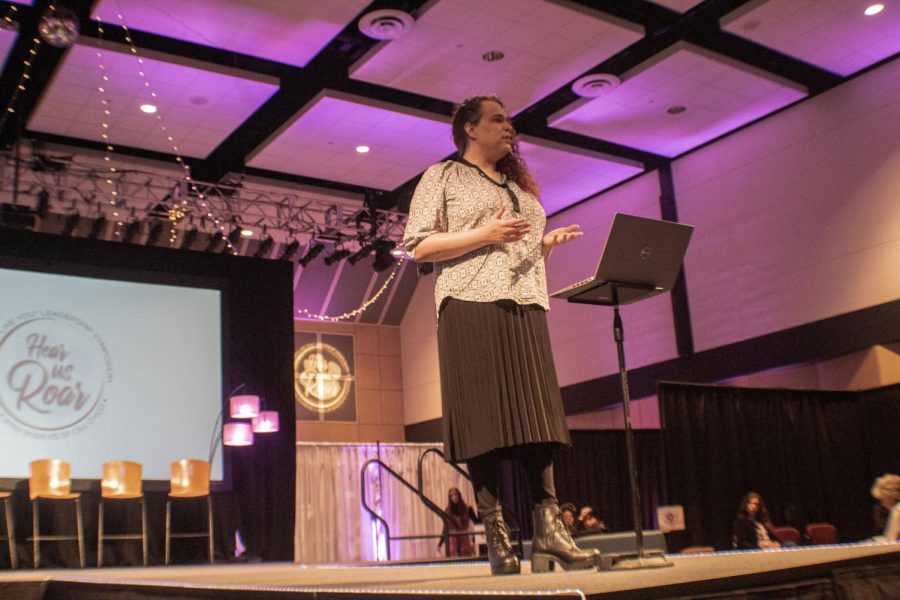
Following Alaniz-Wiggins was Stefanie Marchiano, a licensed marriage and family therapist at the WellCat counseling center. She took to the stage with her laptop in front of her.
Marchiano discussed the difficulties she went through as a transwoman and going to school in the ‘80s. She was often the subject of bullying, including one instance where a group of boys said that it would be “gay” to ride their dirt bikes with her.
Marchiano said, “Being the hippie kid I was, I asked, ‘What’s wrong with being gay?’”
Throughout her life, her authentic values did not match that of society’s. Due to this she decided to stay in the closet for many years out of fear of being judged, or murdered.
“Do I live the life I want to live? Or do I live the life society wants for me, and suffocate to death in the closet?”
Stefanie Marchiano
When she was 34-years-old, she was misdiagnosed with cancer, and it was then that she came to a scary realization that her life was of no consequence to her.
“I was living a life that was designed to keep me safe, but I wasn’t being me,” Marchiano said.
This realization sparked change within her, and she chose to step out of the closet. Marchiano has known hardship, but discovered joy within her newfound, authentic life.
She closed by saying “I am not perfect, but I am perfectly me.”
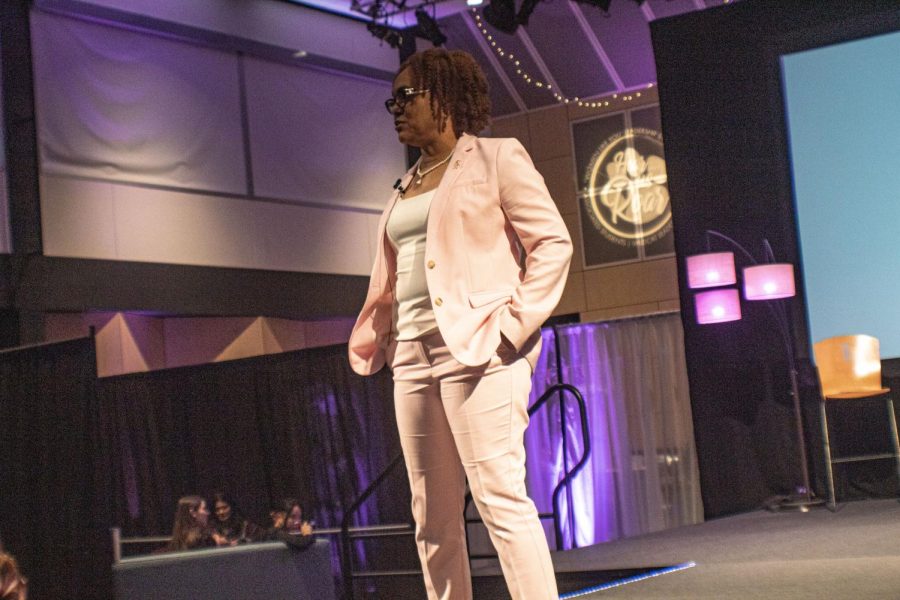
Next came associate vice president for student support programs, Juanita Mottley. As soon as she stepped onto the stage she stated that she would be sharing her trauma. Which included losing her eye as a child after a soda bottle exploded in her hand, losing her big brother and her mother being diagnosed with cancer.
The most prominent story that Mottely told was of her own battle with breast health.
At a certain point in her life Mottley said that she was “existing, not living” as her breast health declined. After a benign tumor diagnosis, Mottley made the difficult decision to have a double mastectomy. After she underwent the surgery, the doctor told her that both breasts were malignant.
“To this day it was the best decision I made. I am proud to say this year I am at my eighth year cancer-free,” Mottley said.
Over the years she lost more important people in her life.
“Stop telling me to be strong, I don’t need to be strong,” she said. “I need to be myself.”
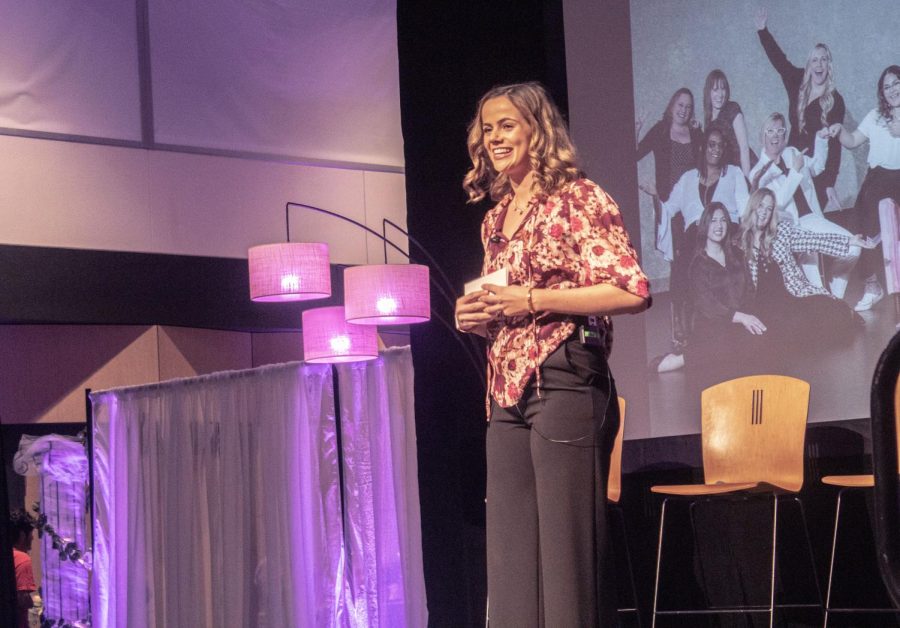
The last leader to take the stage was college of agriculture student and former AS commissioner of sustainability affairs, Michelle Borges. She opened her speech with a poem by Linda Ellis, an author, speaker and poet. Her poem, “The Dash,” describes the time from birth until death as a dash.
“What matters is how we live and love and how we spend our dash,” Ellis’s poem stated.
Borges said she has only recently come to understand where the rest of her dash will go, and that our time is limited. She echoed Marchiano in saying that we should always be our authentic selves.
“We have to take advantage of the countless opportunities Chico State has to offer,” Borges said. “On our graduation day we have to be content with all of the decisions we made during our college career.”
Ariana Powell can be reached at [email protected].
